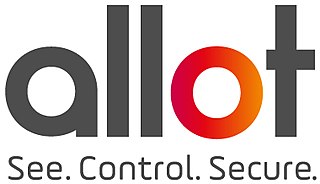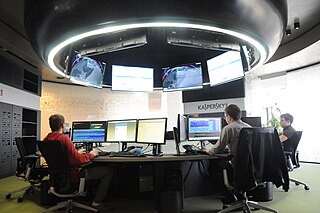
The National Security Agency (NSA) is a national-level intelligence agency of the United States Department of Defense, under the authority of the Director of National Intelligence (DNI). The NSA is responsible for global monitoring, collection, and processing of information and data for foreign and domestic intelligence and counterintelligence purposes, specializing in a discipline known as signals intelligence (SIGINT). The NSA is also tasked with the protection of U.S. communications networks and information systems. The NSA relies on a variety of measures to accomplish its mission, the majority of which are clandestine. The existence of the NSA was not revealed until 1975. The NSA has roughly 32,000 employees.
Computer and network surveillance is the monitoring of computer activity and data stored locally on a computer or data being transferred over computer networks such as the Internet. This monitoring is often carried out covertly and may be completed by governments, corporations, criminal organizations, or individuals. It may or may not be legal and may or may not require authorization from a court or other independent government agencies. Computer and network surveillance programs are widespread today and almost all Internet traffic can be monitored.

Carnivore, later renamed DCS1000, was a system implemented by the Federal Bureau of Investigation (FBI) that was designed to monitor email and electronic communications. It used a customizable packet sniffer that could monitor all of a target user's Internet traffic. Carnivore was implemented in October 1997. By 2005 it had been replaced with improved commercial software.

Allot Ltd., formerly Allot Communications, is an Israeli high-tech company that develops telecommunications software. The company is headquartered in Hod Hasharon, Israel.

NSA warrantless surveillance — also commonly referred to as "warrantless-wiretapping" or "-wiretaps" — refers to the surveillance of persons within the United States, including U.S. citizens, during the collection of notionally foreign intelligence by the National Security Agency (NSA) as part of the Terrorist Surveillance Program. In late 2001, the NSA was authorized to monitor, without obtaining a FISA warrant, the phone calls, Internet activity, text messages and other communication involving any party believed by the NSA to be outside the U.S., even if the other end of the communication lay within the U.S.

Hepting v. AT&T, 439 F.Supp.2d 974, was a class action lawsuit argued before the United States District Court for the Northern District of California, filed by Electronic Frontier Foundation (EFF) on behalf of customers of the telecommunications company AT&T. The plaintiffs alleged that AT&T permitted and assisted the National Security Agency (NSA) in unlawfully monitoring the personal communications of American citizens, including AT&T customers, whose communications were routed through AT&T's network.

Room 641A is a telecommunication interception facility operated by AT&T for the U.S. National Security Agency, as part of its warrantless surveillance program as authorized by the Patriot Act. The facility commenced operations in 2003 and its purpose was publicly revealed in 2006.
Gil Shwed is an Israeli software engineer and entrepreneur. He is the co-founder and CEO of Check Point Software Technologies Ltd, one of Israel's largest technology companies and the world's largest pure-play cybersecurity company.
Brightmail Inc. was a San Francisco-based technology company focused on anti-spam filtering. Brightmail's system has a three-pronged approach to stopping spam, the Probe Network is a massive number of e-mail addresses established for the sole purpose of receiving spam. The Brightmail Logistics and Operations Center (BLOC) evaluates newly detected spam and issues rules for ISPs. The third approach is the Spam Wall, a filtering engine that identifies and screens out spam based on the updates from the BLOC.

Kaspersky Lab is a Russian multinational cybersecurity and anti-virus provider headquartered in Moscow, Russia, and operated by a holding company in the United Kingdom. It was founded in 1997 by Eugene Kaspersky, Natalya Kaspersky, and Alexey De-Monderik; Eugene Kaspersky is currently the CEO. Kaspersky Lab develops and sells antivirus, internet security, password management, endpoint security, and other cybersecurity products and services.

The Utah Data Center (UDC), also known as the Intelligence Community Comprehensive National Cybersecurity Initiative Data Center, is a data storage facility for the United States Intelligence Community that is designed to store data estimated to be on the order of exabytes or larger. Its purpose is to support the Comprehensive National Cybersecurity Initiative (CNCI), though its precise mission is classified. The National Security Agency (NSA) leads operations at the facility as the executive agent for the Director of National Intelligence. It is located at Camp Williams near Bluffdale, Utah, between Utah Lake and Great Salt Lake and was completed in May 2014 at a cost of $1.5 billion.

The Office of Tailored Access Operations (TAO), now Computer Network Operations, and structured as S32, is a cyber-warfare intelligence-gathering unit of the National Security Agency (NSA). It has been active since at least 1998, possibly 1997, but was not named or structured as TAO until "the last days of 2000," according to General Michael Hayden.

The practice of mass surveillance in the United States dates back to wartime monitoring and censorship of international communications from, to, or which passed through the United States. After the First and Second World Wars, mass surveillance continued throughout the Cold War period, via programs such as the Black Chamber and Project SHAMROCK. The formation and growth of federal law-enforcement and intelligence agencies such as the FBI, CIA, and NSA institutionalized surveillance used to also silence political dissent, as evidenced by COINTELPRO projects which targeted various organizations and individuals. During the Civil Rights Movement era, many individuals put under surveillance orders were first labelled as integrationists, then deemed subversive, and sometimes suspected to be supportive of the communist model of the United States' rival at the time, the Soviet Union. Other targeted individuals and groups included Native American activists, African American and Chicano liberation movement activists, and anti-war protesters.
The mass surveillance industry is a multibillion-dollar industry that has undergone phenomenal growth since 2001. According to data provided by The Wall Street Journal, the retail market for surveillance tools has grown from "nearly zero" in 2001 to about US$5 billion in 2011. The size of the video surveillance market rose to US$13.5 billion in 2012 and is expected to reach US$39 billion by 2020.

Upstream collection is a term used by the National Security Agency (NSA) of the United States for intercepting telephone and Internet traffic from the Internet backbone, meaning major Internet cables and switches, both domestic and foreign. Besides the Upstream collection, NSA also gathers information from Internet communications through arrangements with Internet companies under the program codenamed PRISM. Both the Upstream programs and PRISM are part of the Special Source Operations (SSO) division, which is responsible for collection in cooperation with corporate partners.

The Data Intercept Technology Unit is a unit of the Federal Bureau of Investigation (FBI) of the United States, which is responsible for intercepting telephone calls and e-mail messages of terrorists and foreign intelligence targets inside the US. It is not known when DITU was established, but the unit already existed in 1997.
Regin is a sophisticated malware and hacking toolkit used by United States' National Security Agency (NSA) and its British counterpart, the Government Communications Headquarters (GCHQ). It was first publicly revealed by Kaspersky Lab, Symantec, and The Intercept in November 2014. The malware targets specific users of Microsoft Windows-based computers and has been linked to the US intelligence-gathering agency NSA and its British counterpart, the GCHQ. The Intercept provided samples of Regin for download, including malware discovered at a Belgian telecommunications provider, Belgacom. Kaspersky Lab says it first became aware of Regin in spring 2012, but some of the earliest samples date from 2003. Among computers infected worldwide by Regin, 28 percent were in Russia, 24 percent in Saudi Arabia, 9 percent each in Mexico and Ireland, and 5 percent in each of India, Afghanistan, Iran, Belgium, Austria, and Pakistan.
David Hindawi is an Iraqi-born, American billionaire software entrepreneur, and co-founder of cybersecurity firm Tanium.
This is a list of cybersecurity information technology. Cybersecurity is security as it is applied to information technology. This includes all technology that stores, manipulates, or moves data, such as computers, data networks, and all devices connected to or included in networks, such as routers and switches. All information technology devices and facilities need to be secured against intrusion, unauthorized use, and vandalism. Additionally, the users of information technology should be protected from theft of assets, extortion, identity theft, loss of privacy and confidentiality of personal information, malicious mischief, damage to equipment, business process compromise, and the general activity of cybercriminals. The public should be protected against acts of cyberterrorism, such as the compromise or loss of the electric power grid.











